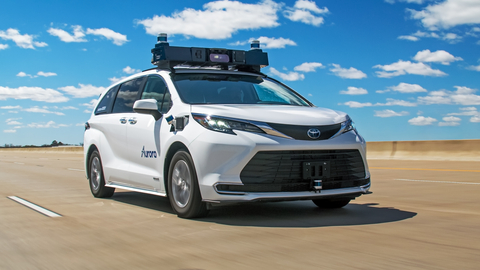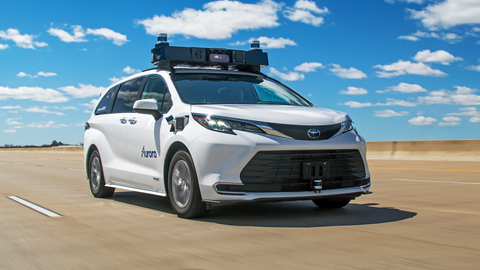DALLAS--(BUSINESS WIRE)--Aurora Innovation, Inc. (NASDAQ: AUR) has unveiled its test fleet of its autonomous custom-designed Toyota Sienna vehicles featuring Toyota’s Vehicle Control Interface (VCI) and “Sienna Autono-MaaS” (S-AM) platform. The Toyota S-AM will serve as the backbone platform for the expected launch of Aurora Connect, its autonomous ride-hailing product.
Aurora has worked with Toyota Motor North America’s (Toyota) engineering team over the last year to establish and refine requirements to prepare this vehicle model platform to integrate with the Aurora Driver. Since unveiling its prototype last fall, Aurora has further refined the Aurora Driver hardware while Toyota built a larger fleet of platform vehicles at its facilities, customized for the requirements of its customers, including Aurora.
Aurora is autonomously testing the fleet on highways and suburban streets in Texas, where the Aurora Driver regularly handles Texas U-turns, high-speed merges, and lane changes, including those in response to vehicles on the shoulder. The Aurora Driver is also able to react to various forms of construction, stop-and-go traffic, inclement weather, and can detect pedestrians, motorcyclists, traffic lights, and more.
In honor of the milestone, Toyota executives were invited to be the first to experience the Aurora Driver in the Toyota S-AM. The riders were picked up at Toyota’s Headquarters and then driven autonomously on a portion of the route that would normally be taken to the Dallas Fort Worth International Airport. The route showcases Aurora’s ability to safely operate at highway speeds, a key technical differentiator that allows it to prioritize popular and lucrative rides, like trips to the airport, when it launches Aurora Connect.
“We congratulate Aurora on reaching their milestone of integrating its Aurora Driver technology onto our Toyota Autono-MaaS platform vehicle,” said Ted Ogawa, President and CEO of Toyota Motor North America. “The route represented what we would expect going to the airport in the future, and we look forward to seeing Aurora’s future deployment plans.”
“Toyota’s engineering team is truly world-class. Experiencing the result together this week was special and is a testament to our progress and respect for one other,” said Sterling Anderson, Chief Product Officer & Co-Founder at Aurora. “We’ve designed and delivered a purpose-built test fleet specifically for a ride-hailing experience that’s comfortable, convenient, and safe, and we look forward to sharing more on our progress soon.”
Aurora’s investment in a Common Core of Technology allowed this fleet to “inherit” all of the learnings and capabilities of Aurora’s next-generation trucks. In fact, the fleet of modified Toyota Sienna vehicles achieved “parity” with Aurora’s trucks within just six weeks of commencing on-road testing. Aurora plans to continue adding vehicles to the fleet and testing in the Dallas-Fort Worth area in preparation for commercial launch.
About Aurora
Aurora (Nasdaq: AUR) is delivering the benefits of self-driving technology safely, quickly, and broadly. Founded in 2017 by experts in the self-driving industry, Aurora is revolutionizing transportation – making it safer, increasingly accessible, and more reliable and efficient than ever before. Its flagship product, the Aurora Driver, is a platform that brings together software, hardware, and data services, to autonomously operate passenger vehicles, light commercial vehicles, and heavy-duty trucks. Aurora is partnered with industry leaders across the transportation ecosystem including Toyota, Volvo, PACCAR, Uber, Uber Freight, FedEx, and U.S. Xpress. Aurora tests its vehicles in the Bay Area, Pittsburgh, and Texas and has offices in those areas as well as in Bozeman, MT; Seattle, WA; Louisville, CO; and Detroit, MI. To learn more, visit www.aurora.tech.
About Toyota
Toyota (NYSE:TM), creator of the Prius hybrid and the Mirai fuel cell vehicle, is committed to building vehicles for the way people live through our Toyota and Lexus brands, and directly employs more than 48,000 people in North America (more than 39,000 in the U.S.).
Over the past 60 years, Toyota has assembled nearly 43 million cars and trucks in North America at the company’s 13 manufacturing plants. By 2025, the company’s 14th plant in North Carolina will begin to manufacture automotive batteries for electrified vehicles.
Through our more than 1,800 North American dealerships (nearly 1,500 in the U.S.), Toyota sold more than 2.6 million cars and trucks (more than 2.3 million in the U.S.) in 2021, of which, more than a quarter were electrified vehicles (hybrids, plug-ins and fuel cells).
Cautionary Statement Regarding Forward-Looking Statements
This Press Release contains certain forward-looking statements within the meaning of the federal securities laws. All statements contained in this press release that do not relate to matters of historical fact should be considered forward-looking statements, including but not limited, to those statements around the development of our technology and commercialization efforts. These statements are based on management’s current assumptions and are neither promises nor guarantees, but involve known and unknown risks, uncertainties and other important factors that may cause our actual results, performance or achievements to be materially different from any future results, performance or achievements expressed or implied by the forward-looking statements. For factors that could cause actual results to differ materially from the forward-looking statements in this press release, please see the risks and uncertainties identified under the heading “Risk Factors” section of Aurora Innovation, Inc.’s (“Aurora”) Annual Report on Form 10-K for the year ended December 31, 2021, filed with the SEC on March 11, 2022, and other documents filed by Aurora from time to time with the SEC, which are accessible on the SEC website at www.sec.gov. All forward-looking statements reflect our beliefs and assumptions only as of the date of this press release. Aurora undertakes no obligation to update forward-looking statements to reflect future events or circumstances.




